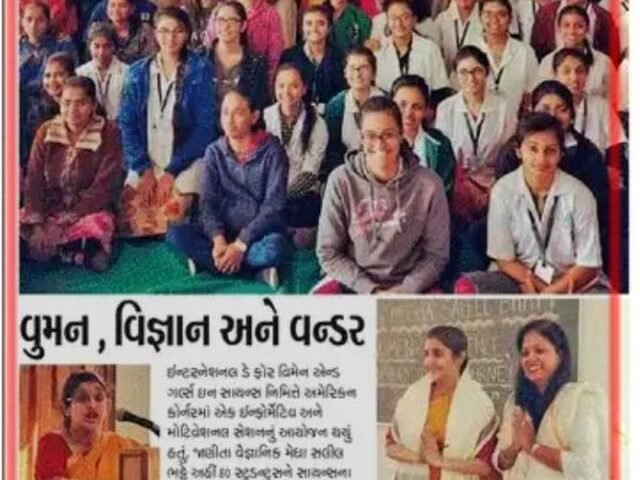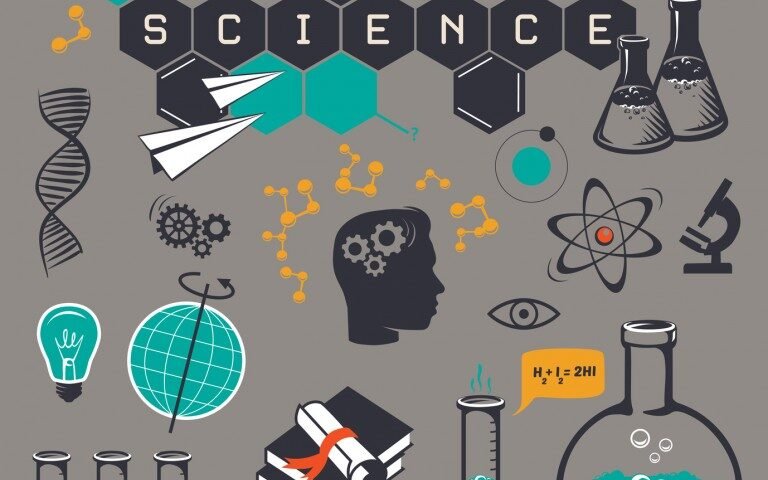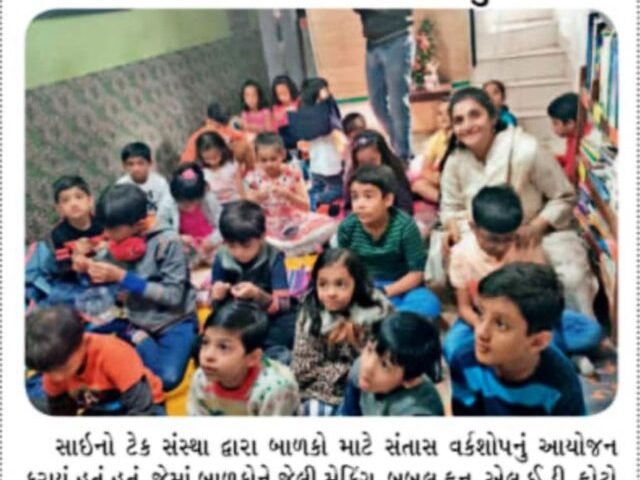Nice coverage in Sandesh about a session on “Magic of Plastics” by Dr. Pradeep Bakshi. The image shows Dr. Bakshi and Dr. Megha Bhatt demonstrating how plastic is made from chemicals.

Navgujarat Samay Quoting American Corner Talk at Jg University
Navgujarat Samay – Celebrating the International Day for Women and Girls in Science with more than 80 Students from Nursing and Physiotherapy from JG University. Thanks, American Corner – Ahmedabad to have invited us for the address. Will look forward to a stronger association.

INDIA STUDYING THE SUN
Young Science Writers’ Program 2019 To study the surface and the interior of the sun is a very difficult job. Did you know, India is planning to study the sun? The India Space Research Organization (ISRO) is planning to carry out its next mission with this objective. The satellite of 1500 Kg, carrying seven science payloads, comprises the best and latest technology. The satellite will continuously observe the sun without encountering an eclipse. This will be possible because of the Lagrangian point (L1). As a matter of fact, the Lagrangian Point has influenced the naming of the space mission. Previously,...

GARBAGE, GARBAGE EVERYWHERE
Young Science Writers’ Program 2019 Garbage can be generally defined as something which was produced by humans which proved to be greatly disastrous for the Earth. There are two types of garbage – Biodegradable and Non-Biodegradable.Biodegradable is something that mixes with the soil and is not harmful. On the contrary, we have non-biodegradable waste. It includes waste which is commonly seen, not only on land but also in water like plastic, cans etc. The whole earth today produces around 2.12 billion kg of waste every year. It means 726 kg of waste per person every year. This number includes every kind...

NANOTECHNOLOGY – THE SAVIOUR
Young Science Writers’ Program 2019 “We are running the most dangerous experiment in history right now, which is to see how much carbon dioxide the atmosphere can handle before there is an environmental catastrophe,” said Elon Musk, the technology entrepreneur. We all know what is Climate Change and what catastrophic changes could follow, but we are so mesmerised by our materialistic wealth that we have forgotten the source of our existence – Our Mother Earth. We are killing the golden goose which feeds us by doing and advocating malpractices and believing in the false notion that there is still time before...

PLASTIC VS HUMANS
Young Science Writers’ Program 2019 We, as humans, are throwing more than 8 million tons of plastics into the oceans every year. Owing to the wastage as well as the pollution created, we are responsible for the maximum damage suffered by the environment. Because of the irresponsible disposal of plastic into the oceans, over one million marine animals die annually! Let us first briefly trace back to the origin and history of plastic. First invented in 1907 by Leo Hendrik Baekeland, a Belgian-born American, living in New York state, plastic had not only economic benefits but also practical reasons at...

VAIBHAVI RAJPARA (GR 3)
SciKnowTech Academics – Coursework for Grade 2 Dear Megha ma’am n Sir, Thank you so much for organizing such wonderful Sciknow Fest. This is very unique way of teaching complicated science concepts in Fun filled way. Our conventional education system ends with stress bursting Exams. Where majority of students just mug up and vomit it in pappers and then everything evoperates in few days or months. But with Sciknow Tech year ends with Sciknow Fest, where students joyfully celebrate this Festival and demonstrate theoritical concepts and it’s relevance and importance in day to day Life and remember it for Life...

GRADE 2
SciKnowTech Academics – Coursework for Grade 2 People who help usOur neighbourhoodOur schoolOur countryPlantsAnimal lifeMy bodyFood, clothing and shelterGood habits and safetyAir, water and weatherRocksForce, work and energyLight and shadowMatterTransport and communicationInstitutions that serve usThe earthOur universeTime Experiential learning unites perception, innovativeness and dynamic collaborations into early years instruction. It permits kids to see reason and to make the most of their learning experience. Learning occurs through the change of encounters. -Subjects combined into one lesson -Using all five senses in science

GRADE 3
SciKnowTech Academics – Coursework for Grade 3 Living and non-living thingsPlantsAnimalsThe human bodyHomeSafety and first aidOur environmentOur universeMoon phasesRocks, soil and mineralsForce, work and energyLightSoundMatterTransport and communicationMy familyFeeding habits of animalsWater o waterGames we playMaking pots



